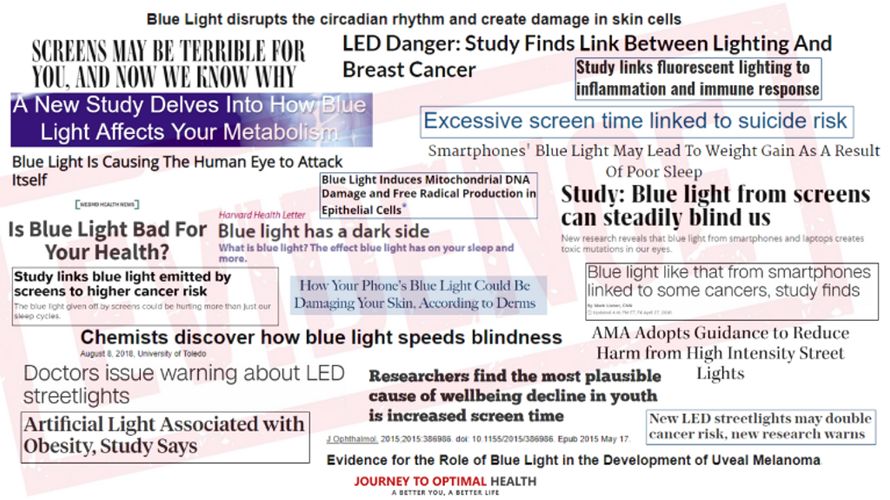One of the most overlooked health risks in today’s world is chronic exposure to blue light. This can lead to poor quality sleep, diabetes, obesity, depression, and other modern day diseases.
Blue light actually looks white to the naked eye. It is emitted from screens on smartphones, tablets, TVs, computer screens, eBook readers, and energy efficient fluorescent and LED lights. So if you work indoors, you are chronically exposed to high levels of blue light.
This is an issue affecting everyone. 80% of the U.S. population has a smart phone and in recent years, there has been a huge shift from incandescent bulbs, to compact fluorescent and LED bulbs.
Almost all of us that work indoors in an office building, hospital, factory, or store are under fluorescent tube lights, with many buildings shifting to LED lights in an effort to save more energy.
For comparison, old fashioned, energy inefficient incandescent bulbs emit full spectrum light over a smooth curve. Fluorescent and LED bulbs have high levels of light in the blue range of the visible spectrum. Your eyes may not notice a difference but your circadian rhythm does.
So what’s the big deal with blue light anyway?
Artificial blue light and natural blue light from the sun are very different. Blue light from technology has four times the blue light that you get from the sun. Blue light from the sun is balanced with red, green, infrared, and ultraviolet light. Life on this planet is adapted to light from the sun and not manmade light.
Infrared and near-infrared light from the sun help repair and regenerate your cells and you don’t get these frequencies from new manmade light sources. Excess blue light creates Reactive Oxygen Species (ROS) and this creates inflammation, even during the day. It also diminishes the function of your mitochondria and then your body has less energy to do the things it needs to do.
Exposure to blue light at night turns off your body’s production of melatonin and this reduces the quality of your sleep. Melatonin is also an antioxidant that protects your brain and increases mitochondrial function.
Lowered melatonin on a chronic basis leads to neurodegeneration and less energy output. This is why you can sleep for eight hours and wake up feeling tired and needing your Starbucks before you can really get going.
When you don’t sleep well you don’t perform well. According to a recent study, a lack of sleep among the U.S. workforce is costing approximately $411 billion and the CDC has declared insufficient sleep a ‘public health problem.’
There’s more to this story than poor sleep. The eye is not only a camera to see with, but it is also a clock to set your circadian rhythm and your eye clock works on different frequencies of light than your eye camera.
The clock in your eye controls your circadian rhythm, which controls every hormone in your body, your metabolism, and all of the cellular growth and regeneration that happens when you sleep. Every organ in your body has its own circadian clock and these clocks are set by your master circadian clock, the suprachiasmatic nucleus (SCN) from the light signals that enter your eye.
When you get the wrong signals in your eye, your circadian rhythm is disrupted and this has an impact on your health. In ruins your internal clock and this affects your cellular growth and metabolism and can lead to diabetes, obesity, depression, and other modern-day diseases.
There’s more. Blue light, especially at night, causes insulin resistance. Most know that insulin resistance leads to diabetes. What is less know is that insulin resistance in the brain leads to Alzheimer’s disease. That is why Alzheimer’s disease is also called Type 3 Diabetes.
Blue light also causes Leptin resistance. Leptin is the master hormone that controls energy and fecundity. Most obese people are Leptin resistant and most have no idea that anytime they watch TV at night, or are on their computer, or smartphone, they are contributing to their obesity.
What can you do?
- Look at the sun first thing in the morning and take breaks throughout the day to expose your eyes to natural sunlight. This sets your circadian rhythm
- Install f.lux or Iris on your computer to reduce blue light emitted from your screen. The ScreenShader Chrome extension is another option
- Turn on Night Shift on your iPhone or install Twilight if you have an Android
- If working on a computer or under blue lights all day, strongly consider wearing blue- blocking glasses, such as BluTech or the equivalent. You can also purchase Uvex blue- blocking glasses at low cost, however, they are not as stylish
- Ditch energy-efficient bulbs and opt for incandescent or halogen bulbs
- Use red bulbs at night to protect your melatonin
The key is to reconnect with nature as much as possible.
All the information discussed above is well documented. It just hasn’t found its way to clinical medicine. Saving energy is a good thing except for when it makes you sick and robs you of performance. Maybe it’s time we rethink our choice of indoor light.





















